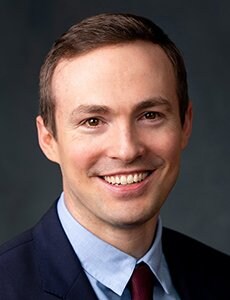Internal or family medicine - which is the right fit for you?
by Jessica Brewer, LMH Health
Your primary care physician walks with you through many stages in your life. Whether you’re new to the area or looking for a new primary care physician, you want to make sure you’re finding the right fit for you. Both Internal medicine and family medicine doctors are considered primary care doctors, but what’s the difference?
Dr. Walter Ingram, internal medicine physician at Reed Internal Medicine, and Dr. Jason Foster, family medicine physician at Family Medicine of Tonganoxie, shared the differences between the two primary care practices.
Family medicine does what its name suggests, it provides medical care for families. Though internists also provide care to families, family medicine physicians provide care for pediatric patients and adult patients. These physicians may care for multiple generations of family members at the same time, both young and old.

Jason Foster, MD
“A definition of family medicine would be whole-person care,” Dr. Foster said. “We see individuals of all ages and their families.”
An internist treats patients who are 18 years and older. To treat children, an internist needs pediatric training along with their internal medicine training. Therefore, internists do not typically see children but focus more on caring for adults and elderly patients and being a partner in their healthcare.
“The American College of Physicians refers to us as ‘the doctors for adults’,” Dr. Ingram said. “As an internist, we will see people that have multiple medical problems and sometimes have long lists of medications.”
Though the type of patients treated is one of the main differences between the family and internal medicine, another difference is in the physician’s training during residency.
“At my training institution, those who completed residency in family medicine had more exposure to office-based procedures – everything from pediatrics to geriatrics,” Dr. Foster said.

Walter Ingram, MD
Dr. Ingram agreed with that assessment. “The difference in residency training between the two practices focuses on emphasis of training,” he said. “Typically, family medicine physicians get training in office-based procedures, but internists are trained in numerous procedures as well. Family medicine training is more generalized on their emphasis, anything from obstetrics to geriatrics, while internal medicine is more focused on adults and inpatient medicine. A general internal medicine physician is trained in each medicine specialty in residency. At the end of residency, they can go on to practice general internal medicine or continue training to subspecialize in one of the internal medicine specialties.”
Internists can subspecialize in non-surgical practices like oncology, rheumatology, allergy and immunology, pulmonology, infectious diseases and more. Dr. Ingram said when you see a physician in a specific specialty, more often than not, they are internists who have received specialized training to practice in a more individualized field.
“No matter who you see, primary care is important,” Dr. Ingram said. “Consider primary care the conductor on the train. We manage our patients as a whole and we direct what move they make next. Everyone needs someone to help lead them in their care and though someone may see multiple specialists, they need someone to pull it all together. It’s also good to build and have a relationship with a primary care physician who knows you and can take into account your medical history.”
Whichever type of practice you choose to visit, the importance of primary care remains the same.
“Primary care empowers people to take charge of their health,” Dr. Foster said. “It helps people to become more productive, save money, avoid hospitalizations and ER visits and prevent serious diseases before you experience a health-related setback or disaster that could have been avoided.”
Jessica Brewer is the social media and digital communications specialist at LMH Health.